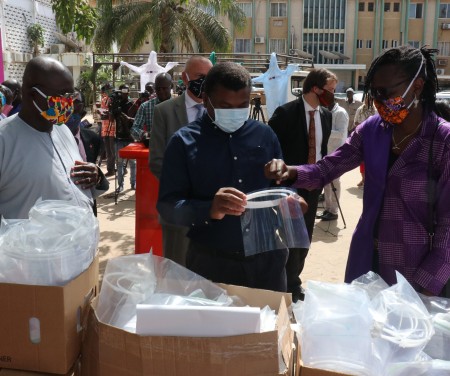OBJECTIVES
Objective of the program is to explore how 3D printing can enhance local youth-led businesses and activities on a sustainable basis. 3D Printing (sometimes referred to as Additive Manufacturing) is a rapidly growing industry offering new potentials of production in many fields (medicine, automotive, agriculture, education, etc.). 3D printing played a significant role during the early stages of Covid-19 pandemic by providing response to the increased demand of medical equipment and PPEs and tackling the disrupted international supply chains. Most widespread technology of 3D printing is fusion deposition modeling (FDM) which works on the principle of depositing melted raw material (filament, mostly thermoplastic) in the tiny layers on top of each other until the whole object is created based on the previously made computer 3D model. Make3D Company Limited as the only 3D printing company in The Gambia partnered with International Trade Centre/Youth Empowerment Project to provide access to the FDM technology to Gambian youths and youth led projects in following categories
● 3D printing as branding
● 3D printing for local manufacturing of tools and equipment
● 3D printing in IT and technology
● 3D printing as assistive devices to help with inclusion of people with disabilities and education
● 3D printing in Covid-19 response, medicine and science
The two winning projects in each category will be awarded with 3D printing services by Make3D Company Limited in the value of 16000GMD including consultation, 3D design and actual production using Original Prusa i3 MK3S 3D Printers and variety of materials (PLA, PETG, ABS, Copper3D PLActive, Flex, etc.) Before the application we strongly recommend to study the following articles: Information about 3D printing in general: https://all3dp.com/1/what-is-3d-printing/ How is FDM 3D printing used worldwide: https://www.prusa3d.com/stories/ Inspiration about 3D models on: https://www.thingiverse.com or blog on https://blog.prusaprinters.org/ Keep in mind some key advantages and disadvantages of desktop FDM 3D printing technology
● Our 3D printers can produce very complex shapes with precisely defined internal and external structure however the maximal size of the object is limited to 21x21x25cm and a variety of materials are also limited to plastic and rubber-like materials.
● FDM 3D printing is a very slow process in general - printing of one object with the size 5x5x5cm can take 3-5 hours, and the commercial price of 3D printing can be between 200-500GMD per hour, therefore 3D printing might not be always suitable for mass production
. ● 3D printing has a great advantage in creating customized objects or things on demand for the customer (that is why we work in medicine to create customized orthopedic braces) and rapid prototypes. If you make a change in your 3D printed product it has a minimal cost to adjust the production.
● 3D printing can provide a rapid response in disrupted supply chain
● Check examples of our products on our social media for inspiration: https://www.facebook.com/make3dgambia, https://twitter.com/make3dgambia?lang=en
The application is open to Gambian youths (18 - 35 y.o.), youth led institutions, NGOs and companies. Women applicants and women led institutions are encouraged to apply. Applicants must demonstrate the understanding of the FDM 3D printing technology in the proposal and provide a sustainable business plan. Applicants must have a valid business registration or intention to register a business in The Gambia in the future. EVALUATION CRITERIA The applications will be assessed based on the following criteria:
● Relevance of the proposal in view of the outlined objectives
● Demonstration of a good understanding of advantages and disadvantages of the desktop FDM 3D printing technology
● Relevant and efficient use of the desktop FDM 3D printing technology in the proposed project
● Impact on the youth
● Sustainability of the business model and economical viability beyond received support The applications will be evaluated by YEP and Make3D All proposals must be received by 21 October 2020 23:59 GMT. Proposals and supporting documents should be sent via electronic form (https://forms.gle/KHCcbLZChL19xD5H8). For information on submission please contact Mrs. Fatou Juka Darboe, Director of Make3D, at +220 707 4837 or info@make3d.org.
